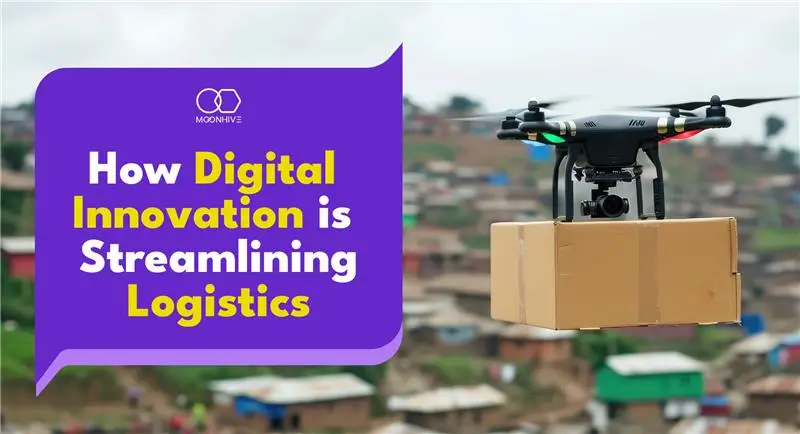Digital logistics transformation is no longer a futuristic concept it is a reality reshaping global trade. Traditional supply chains once ran on paper-based systems, manual coordination, and delayed updates. Today, technology drives efficiency, speed, and reliability. Startups in the UAE, UK, Canada, and beyond are creating logistics-focused MVPs that rely on automation, predictive analytics, and cloud platforms. Those who embrace this shift early not only meet customer expectations but also gain a sustainable competitive advantage.
Digital Logistics Transformation in Real-Time Visibility
Real-time visibility is the heartbeat of logistics. Customers no longer accept vague delivery windows or tracking numbers that refresh once every few hours. Instead, IoT-enabled devices, GPS systems, and fleet-management dashboards provide instant shipment status updates.
For example, a logistics startup in Dubai can monitor its fleet crossing into Oman in real time, reroute drivers around traffic congestion, and alert customers of revised delivery times all through one digital dashboard. This level of transparency builds trust, reduces failed deliveries, and saves costs associated with delays.
Related Insight: The Shift to Real-Time Logistics Platforms
Automation in Digital Logistics Transformation
Warehouses are no longer static storage facilities they have evolved into smart hubs thanks to logistics . Automation technologies such as robotic arms, conveyor sorting systems, barcode scanning, and robotic process automation (RPA) are revolutionizing how goods are stored, sorted, and shipped.
For instance, a Canadian startup managing cross-border trade with the U.S. can reduce human error by using automated sorting lines and robotic inventory scanning. Not only does this cut labor costs, but it also improves accuracy, ensures compliance with customs, and accelerates throughput. The result? Faster deliveries, lower costs, and the ability to scale operations across markets.
Related Read: 10 Mistakes to Avoid When Launching a Startup
Data-Driven Decisions in Digital Logistics Transformation
Data is the backbone of logistics . Without accurate insights, logistics becomes guesswork. AI and predictive analytics now allow companies to forecast demand spikes, anticipate fuel cost fluctuations, and allocate resources more efficiently.
For example, an early-stage startup can track three core metrics:
- Delivery times – Measure how quickly packages reach customers
- Route efficiency – Identify wasted fuel or detours
- Customer satisfaction – Collect ratings to refine operations
Armed with these insights, startups can refine their MVPs and attract investors by proving operational efficiency.
Related Read: Startup Metrics 101: A Founder’s Guide to Measuring What Matters
Cloud Platforms in Logistics
Cloud technology takes logistics beyond borders. Unlike legacy systems that require heavy infrastructure, cloud-based logistics platforms enable startups to manage operations across multiple geographies from one centralized system.
For example, a logistics company based in the UAE can coordinate deliveries in Qatar, Oman, and the UK through a single cloud dashboard. Features such as real-time fleet tracking, integrated billing, and mobile apps allow small teams to scale globally without large upfront costs. This makes cloud adoption one of the most powerful strategies for early-stage founders.
Related Read: How to Build Your MVP the Right Way
Compliance in Digital Logistics Transformation
While technology enables rapid growth, compliance remains critical in logistics. In the UK, startups must follow GDPR when handling customer data. In Canada, PIPEDA sets strict rules for privacy and data handling. Ignoring these laws can lead to heavy fines and reputational damage.
On the other hand, GCC nations like the UAE are driving logistics innovation through national digital economy strategies. This creates opportunities for startups that balance compliance with bold innovation. For example, building region-specific MVPs that comply with local customs and data protection laws can help founders expand faster across regulated markets.
Related Read: Building a Compliant MVP in Canada
Building Lean and Smart in Logistics
The key to thriving in logistics is building lean and smart. Startups should avoid bloated systems and instead focus on MVPs with core features like real-time tracking, predictive analytics, and cloud integration.
By measuring results early, validating assumptions, and scaling based on data, founders can outpace competitors who rely on outdated, manual models. In a market where customers demand speed, accuracy, and transparency, the smartest strategy is to start small, measure everything, and grow with confidence.
Related Read: How to Build Your MVP the Right Way
Are you ready to build a logistics-focused MVP that thrives in a digital-first world? Download Moonhive’s free MVP Planning Checklist and learn how to design, validate, and scale smarter. https://moonhive.in/mvp-planning-checklist/Download the Checklist Here
